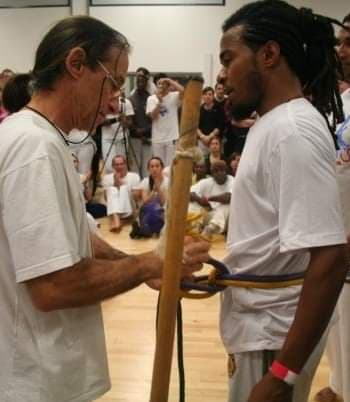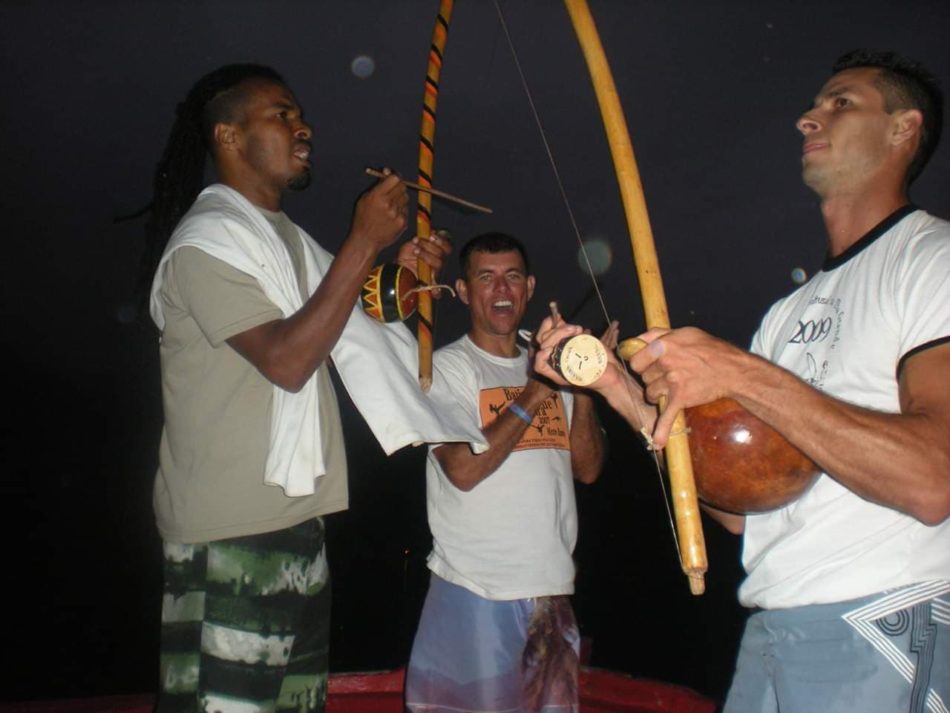
Centro Cultural Senzala London is celebrating its 15th anniversary this year.
To celebrate, we’re posting a series of interviews with our teachers so you can get to know them a bit better.
Here’s the final interview (part 3/3) with Contra Mestre Julio Sanhaço, shortly before his formatura to become a master.
Read part 1 and part 2.
Tell us a bit about your classes – what’s your teaching philosophy? How do you plan classes?
My style and mentality or technique comes from my master – such as the combination of movements, like warming up with calisthenic movements adapted to capoeira. For example instead of star jumps, we adapt movements to warm us up into a capoeira sequence or routine. Or imagine a sequence with queda de rins, then having movements based on capoeira angola used for jogo de dentro (the technique that Mestre Peixinho developed) and spinning kicks from regional style – mixed also with music and acrobatics.
Another good thing about capoeira is that we can create movements that force you to react more, we can work on reflexes, or power so you physically get stronger. I think of this a lot during the week, although I don’t plan lessons exactly.
– What advice would you give to someone thinking about trying out capoeira?
The best advice I would say is to try it! It’s the best way, it gives you information to feed yourself; to get to know yourself – you learn a lot about yourself and about dealing with other people and situations through physical activity. People sometimes go to class to get fit but capoeira can teach a lot more and you can gain a lot more, so just try it. It’s too much information to describe in a few lines so you have to just try it out and see the fun side of it. Capoeira is very generous to people – it gives a lot more to us than the effort we put in. We also make a lot of friends through it, and receive information, pleasure, and knowledge, and we can learn a new language and music.
– How do you feel about becoming a Mestre soon, and what does it mean to you?
Obviously it is very important, although I never really think much about belts and gradings. Mestre Peixinho is the real master and it was great to learn from him, then he would decide when to change our belts. But sometimes the time arrives for the community to see you as a more experienced capoeirista.
I feel prepared but when I look back at everything I have been through, I have been through a lot to build a school up. It isn’t easy, and you go through many difficulties. It has never been easy for capoeira. When I started, police in Ilha Grande would search me – the community didn’t like capoeira, so you have to prove you are doing something nice. It was a difficult path to bring capoeira to people.
Then there is a moment when you are recommended to become a master, and you feel like – wow I have been through a lot! Some friends stopped capoeira along the way and they call me crazy for still doing it, but then they wish that they’d continued… I am glad and thankful for capoeira, for my masters, for other capoeiristas, and for everyone from Senzala especially. You meet a lot of great people and masters around the world and it is a big family – friends call you from abroad, or you meet people in places that you are connected to through capoeira. Students visit you because they like what you do. It’s recognition.
How it feels to become a master? I don’t know – ask me after the formatura! I can tell that it will be emotional. I saw Mestre Hiram’s formatura not so long ago [from Capoeira Club London], and you reflect on everything you’ve been through, and remember students from 20 years ago who are part of who you are. I spoke to my students in Brazil from my first school about my formatura – they will do their best to be there. They are also part of my path to becoming a master, so it’s really nice. I am looking forward to Brazil this month – and it’s a new chapter for our group. It will be great.

Julio teaches classes for children and adults of all levels throughout the week. Check out our class timetable here.
Read our other teacher interviews with Foo, John, Roland and Ronaldo.
